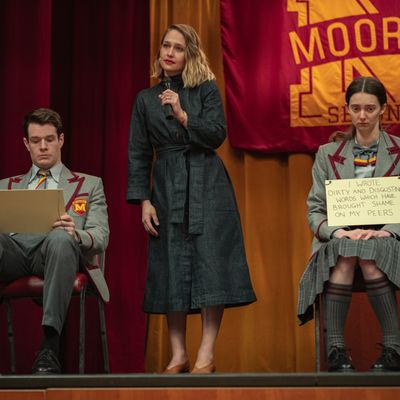
We got a brief glimpse into Hope Haddon’s personal life in the last episode, witnessing her ongoing struggle to conceive. But there’s a scene early in “Episode Six” that works better at establishing Hope as more than a mustache-twirling villain. When Mark, the school board head, visits her at Moordale and stresses the need to appease the investors, we begin to understand: Hope is a tool of the bureaucracy. She’s one piece of an archaic system that still sees open discussion of sex as inappropriate. No matter her personal biases, she’s backed into a corner — without cleaning up Moordale’s image, there’s no money, and without money, there’s little possibility of adequately providing the resources that underprivileged students like Maeve need. Hope doesn’t actively relish restricting kids’ freedoms. To her, it’s just a necessary part of the job. It’s a way to help them.
And then she calls Lily, Cal, and Adam to the stage for a public shaming during an assembly, and any empathy we may have had for Hope’s challenging position quickly washes away. All three kids are forced to wear signs and declare their faults. Cal, seen as a girl, still refuses to conform to the rigidity of the dress code and thus is “a slovenly troublemaker who doesn’t care about [their] peers.” Adam, who took credit for the poop incident last episode, is “unhygienic and put [his] peers at risk” — and Rahim’s attempt to defend him, to say that school shouldn’t be a place for fear, only gets himself suspended.
Most gutting, though, is the brutal shaming of poor Lily, who just wanted to share her alien erotica with other people who might enjoy it and instead has become a laughingstock. Lily has had to work hard, over the years, not to lose herself; as an early teen, she got in trouble for sharing her erotica with a girl on the playground, and her well-meaning mom told her that she should keep it to herself, since “Nice girls don’t really talk about all that S-E-X stuff.”
Now, in her last year of school before university, Lily’s confronted with the toughest challenge to her sense of self yet. “I don’t think my story was dirty,” she says, looking down at the sign in her lap. Hope bends down close to her ear, frowning slightly, and asks, “Then why is everyone laughing at you?” Looking out at the silent audience before her, Lily knows that part of what Hope is saying is true. Even if her stories are harmless, people were laughing. They do think she’s strange. So Lily reads the words that she didn’t believe before but might believe a little now: “I wrote dirty and disgusting words which have brought shame on my peers.”
Much like Lily, Eric is somebody who’s always been happiest by being unapologetically himself. But visiting Nigeria, where being openly gay is illegal, challenges his ability to do that. It’s a painful tug-of-war in Eric’s heart: This is a place that means so much to him, a place where he can reconnect with his roots and see the extended family he misses so much. But it’s also a place where a central part of himself must remain hidden. When his family takes pictures before his cousin’s wedding, and his mother repeatedly steps in to aggressively sidestep his grandmother’s questions about having a girlfriend, Eric can barely force himself to smile.
Luckily, the photographer, Oba, recognizes the look in Eric’s eyes and understands. At the wedding, feeling isolated by the need to hide himself and annoyed by his mom’s flirting with her ex-fiancé, Eric allows Oba to sweep him away on a magical night among the secret queer community of Lagos. There’s a scary moment when he gets carried away in the cab, attracting too much suspicion from the driver. But once they’re in the club, a place he only could’ve found if he’d spent his entire life in the country, Eric feels free for the first time in Nigeria. He’s so caught up in the feeling that he makes out with Oba on the dance floor.
When Eric arrives home the next morning, he gets into an argument with his mom about the casual lies she tells her family about her husband’s career in England. To her, it’s easier to lie sometimes than face her family’s disapproval — an issue Eric has already overcome in his own life, especially over the past two years. What Eric learns by visiting Nigeria and witnessing how even his mother still has a lot to learn when proudly expressing herself is just how independent he’s become. It’s amazing to see Eric recognize his own ability to adapt in a place that can be so dangerous for someone like him. Queer joy finds a way to thrive.
Michael Groff isn’t even sure he’s capable of feeling joy. He comes to Jean to admit the truth of all the things Maureen said about him in her sessions last season. But he doesn’t know how to change; he grew up with an affectionate mother and a bullying father who taught him to shut off his emotions, then repeated that cycle with his own son. Jean assigns him to find something that brings him joy — later, we see him peel an apple and crack an egg, smiling as he remembers the childhood memories of his mother. It’s a tiny moment, but it means the world.
Sex Education is a show about kids and adults alike learning about themselves and communicating their desires. But Hope’s goals are antithetical to that. Until now, Viv has defended the headmistress’s stifling new policies. But after the announcement of Hope’s “Sparkside Academy” rebrand and the humiliation of Viv’s classmates, she finally starts to see Hope’s true colors. The final straw is Hope’s suggestion that Viv present for the school’s open day, just because having a woman of color leading the way will prove how progressive the school is. “So it’s about how it looks,” Viv says. “Of course it is,” Hope replies.
It’s the moment when Viv finally decides to fight back — by recording Hope on her phone as she monstrously trivializes the “supposed issues” and “identity-obsessed hysteria” of her “petty little peers.” She sends it out to all the students, urging them to come to the student forum to enact change. Hope’s authoritarian leadership is getting out of control — if something doesn’t change soon, who knows the consequences for the students?
All the Good Things and the Bad Things That May Be
• When Erin kidnaps Maeve’s sister Elsie during visitation, Maeve needs a grounding force, someone to quietly be there for her and not add to her stress. But neither Otis nor Isaac is capable of that, each justifiably convinced that the other doesn’t deserve Maeve. Isaac comes across as the marginally more mature one when it comes out that something did happen between Otis and Maeve on the class trip.
• Otis, in general, acts like a bit of a brat in this episode, but in a way that rings true and never crosses into cruelty the way he did last season. He’s right to feel frustrated with Jean for bringing Jakob and Ola into their home and allowing him to become comfortable with a family arrangement that might already be ending.
• Aimee makes a delightfully diverse array of vulva cupcakes but has to shut down her stall. More importantly, she confesses to Jean that she sometimes blames herself for her assault, given Maeve’s correct description of her as a people-pleaser. Jean patiently, beautifully helps her understand that the assault was about him and had nothing to do with her or her personality.
• A satisfying line from Cal, calling Hope out for driving a wedge between them and another non-binary student the same way she did between Jackson and Viv: “Is there too much power in multiple otherness for you?”
• The continued absence of Eric’s dad, who disappeared from this show after the first season, is even more glaring when there are so many conversations about him in Nigeria. It seems filming schedules may be to blame but why has there not been a cursory explanation of what happened to him in the show?
• Interestingly, when Eric uses gender-neutral pronouns to tell his grandma about Adam, she echoes them back to him. Is that a sign that she suspects the truth, or is she just automatically repeating the pronouns he used?


